Electrical Fires: Causes, Prevention, and Safety Measures
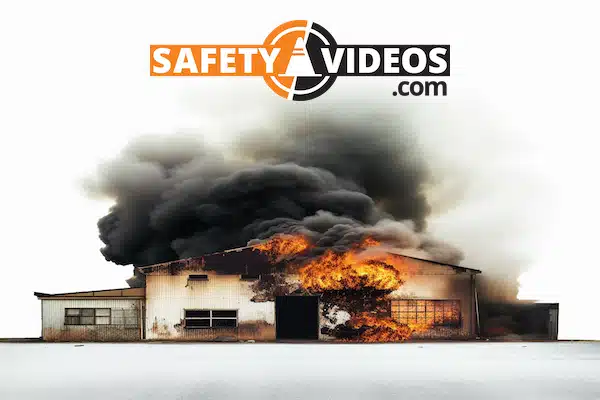
Home electrical fires are a constant threat to our well-being. The National Fire Protection Association (NFPA) reported that fire departments responded to house fires involving electricity-related malfunctions over 46,000 times yearly between 2015 and 2019.
Understanding the common causes of electrical fires and how to prevent them is paramount, as are the consequences of neglecting basic safety regulations. In addition to this discussion, we also offer a complete electrical safety training video so that your employees can understand electrical safety.
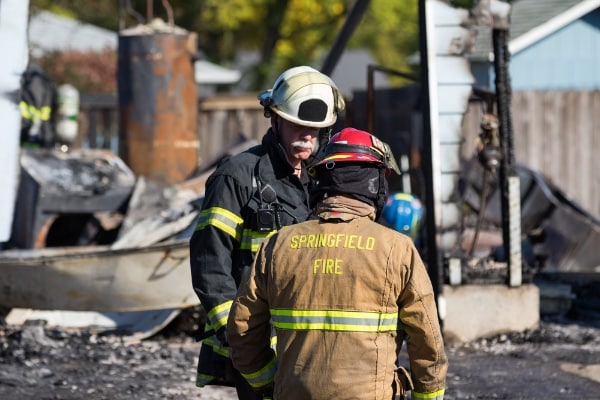
Causes of Electrical Fires
Here are some of the most common causes of household fires caused by electricity.
Misused Extension Cords and Power Strips
Extension cords provide extra outlets or bring electricity to hard-to-reach areas. However, it’s important to remember safety practices when using them.
One major concern is that they can overheat if used incorrectly. Moreover, electrical appliances plugged into an extension cord can malfunction or become damaged if used improperly or for extended periods.
To use your extension cords safely, there are a few things you should keep in mind:
- Never plug a single extension cord or power strip into another.
- Always check for a worn or frayed cord before you use it.
- Never plug extension cords or power strips into faulty outlets.
- Ensure you’re not running appliance cords through walls, ceilings, or floors.
- Never take the grounding plug off of a cord to use it in a two-prong electrical outlet.
When using extension cords with multiple appliances, it’s especially important to be careful. Extension cords can quickly overheat with the electricity these appliances draw, especially if they’re being used in a confined space where air can’t circulate them, resulting in a frayed cord.
[We also have some other electrical safety tips you should check out]
Faulty Light Fixture
Faulty light fixtures are a leading cause of electrical fires in homes. Bad lamps and faulty outlets are two common culprits.
Many light fixtures and light bulbs are too old for continued use. Outdated wiring and other components may deteriorate over time, making them more susceptible to malfunctioning and overheating.
Some light fixtures and light bulbs are not installed correctly. Improper installation can lead to electrical shorts, which can spark a fire.
Lastly, some light fixtures may use bulbs with a wattage that exceeds the maximum recommended bulb wattage for that light fixture. When this happens, the excessive power load generated by the bulb can cause the lighting fixture to overheat and potentially catch fire.
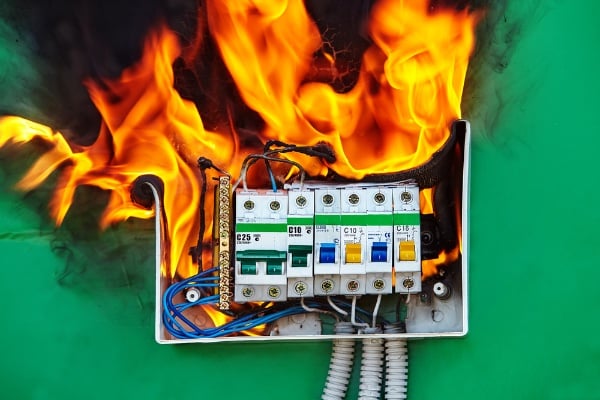
Old and Damaged Household Wiring
The wiring in your home plays a crucial role in ensuring your appliances run smoothly.
If your wiring is old or damaged, it may struggle to keep up with the power demands of modern devices, and thus, result in property damage. Outdated breaker boxes pose a significant fire hazard in older homes and apartments.
Even if your outdated wiring appears to be in good condition, it may not be designed (in terms of wiring capacity) to handle the strain of newer electronic equipment, which can cause it to malfunction or fail.
Many of us use a wide range of electronic devices daily. Adding these newer items to your existing appliances – such as air conditioners and microwaves – can put a tremendous amount of strain on your system and cause wiring problems, leading to house fires.
Space Heaters, Portable Heaters, and Air Conditioners
Portable space heaters and air conditioners can be lifesavers during extreme weather. They’re easy to use and make a big difference in keeping your space comfortable.
However, it’s important to utilize a portable heater safely, as improper use can cause electrical fires.
One common mistake is placing space heaters near combustible surfaces like curtains, rugs, or furniture. If the heater gets too hot, it can ignite flammable items, causing serious damage to your home.
To prevent electrical fires, keep space heaters away from any flammable surface.
Another mistake to avoid is leaving your space heater on for too long. It’s important to turn it off when you leave the room or go to bed, as prolonged use can increase the risk of an electrical fire, especially around combustible surfaces.
Moreover, make sure your space heater (especially if you’re working with coil space heaters) is in good working condition and can diffuse heat evenly. Dysfunctional coil heaters are among the most common causes of electrical fires.
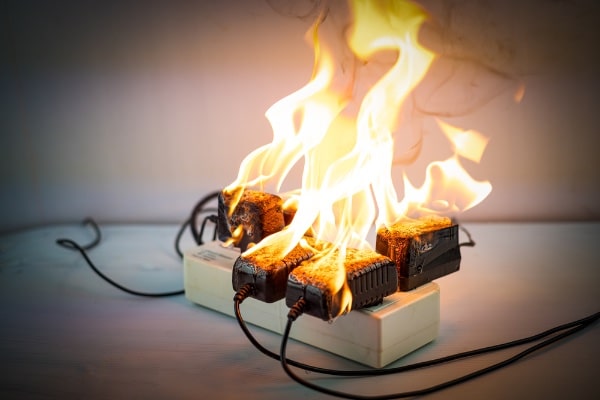
How to Prevent Electrical Fires
1. Practice Safe Habits
To keep yourself and your home safe from electrical fires, it’s important to develop safe habits when using appliances.
Look for products approved by the Electrical Safety Foundation International (ESFI).
Ensure to carefully follow the manufacturer’s instructions on wattage usage, electrical distribution, etc., to avoid any potential safety hazards.
When it comes time to clean smaller (even outdated) appliances like toasters, toaster ovens, and coffee makers, always remember to disconnect them from the power source before cleaning them.
2. Get Your Wires in Order
Living in an older home or apartment might have frayed electrical cords, a major reason for electrical failure.
It’s essential to have your electrical system inspected by a qualified electrician if your home exhibits any of the following signs of insufficient wiring:
3. Have a Readily Available Fire Extinguisher
Fire extinguishers, both in the workplace and at home, are essential for preventing electrical fires in an electrical panel or elsewhere.
Class C fire extinguishers can mitigate Class C fires. Spray the entire surface to ensure all flames are extinguished.
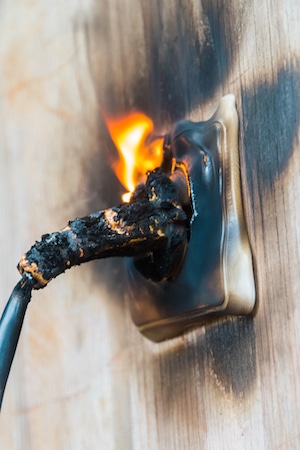
Final Thoughts
Understanding the common causes of electrical fires and how to prevent them is crucial to keeping you safe from a devastating accident.
Always have a fire extinguisher on hand, keep your smoke detectors in good working order, and remember that old and malfunctioning wiring is a leading cause of electrical fires in homes. Have any issues examined by a licensed electrician right away. Finally, electrical fires should be part of any electrical safety training that you provide to your crew.
Frequently Asked Questions
What is considered an electrical fire?
It’s a type of fire caused by an electrical fault, short, or malfunction. They often occur when currents generate excessive heat near flammable materials such as paper, insulation, or dust.
Not every fire that involves electricity is considered an electrical fire. If a fire starts due to an overheated appliance that is not caused by an electrical malfunction would not be considered an electrical fire.
However, if the overheating occurred due to an electrical issue such as frayed cords or faulty electrical outlets, it would be considered an electrical fire.
Can an electrical fire start if the breaker is off?
Absolutely. It’s a common misconception that turning off circuit breakers eliminates the risk of residential fires. While turning off the breaker can reduce the chances of an electrical fire, it’s not a foolproof prevention method.
Even when the circuit breakers are off, electricity may still flow to certain appliances or devices that are plugged in. If one of these items has a faulty component or is damaged, it can create a spark or a short circuit that can ignite an electric fire.
This also makes surge protectors a smart investment for your electrical circuit.
What are the warning signs that precede an electrical fire?
Awareness of the warning signs of electrical fires can help you take prompt action and prevent a potentially dangerous situation.
Here are three common indicators to watch out for:
Dimming or flickering lights: If you notice your lights flickering or dimming frequently, it could be a sign of an overloaded circuit, faulty wiring, poor material quality, or a failing electrical component.
Burning smell: A persistent burning odor could indicate a major fire threat. It’s important to take this seriously and seek a qualified electrician immediately.
Hot outlets or switches: If your electrical outlets or switches feel warm to the touch, it could indicate a wiring issue. Overheating can cause electrical components to fail and potentially lead to a fire.